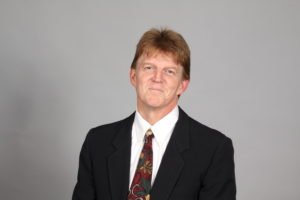by Dennis Dalman
Having been the mayor of St. Joseph for 10 years, Rick Shultz wants to keep the job and is vying again, this time versus candidate Anne Buckvold (see related story).
Schultz has been elected four times since 2010, and three of those times he ran unopposed.
He has also served on the city council, planning commission, park board, the economic development association and the (St. Cloud area) planning organization.
“In my 10 years, we’ve seen a tremendous amount of growth, expansion and controlled change,” Schultz said, “a new city hall, downtown expansion, housing additions, park land and facilities enhancements. Those who truly know me understand I use a good amount of humor to keep the mood easy and tension down while working through complicated, stressful issues.”
Schultz holds an associate’s degree in computer operations from St. Cloud Technical College and a bachelor’s degree in education from St. Cloud State University.
Married for 39 years, he and his wife have three daughters and three granddaughters.
Schultz serves on many committees and boards: League of Minnesota Cities, Coalition of Greater Minnesota Cities, Mayors’ Association Executive Committee (president), Improving Local Economies Committee, Improving Service Delivery Committee, Land Use Committee, St. Joseph Lions (president) and formerly the St. Cloud School District Strategic Planning Group. For St. Joseph, he serves on the Fire Relief Board, Visitors and Convention Bureau, Economic Development Association, Personnel Committee and the St. Cloud Area Planning Organization.
He was honored with the Distinguished Service Award (St. Cloud School District) and the Excellence in Service Award from the Coalition of Greater Minnesota Cities.
The pandemic crisis has brought challenges, he said. The biggest, he added is the economy, including interruptions of businesses and safety procedures against the Covid-19 virus.
“We have done some prep work for the unexpected, but not knowing what could happen and where we will be is a concern,” he said. “My emphasis has been to be flexible and prepare for sudden shifts in state policy. I also emphasize the needs of businesses and residents.”
Schultz said making sure the city remains financially solvent is vital due to uncertain revenue projections from the state, un-allotments and the possibility of remaining in further business lockdowns.
Other challenges/opportunities, he said, are making the newest industrial park and working with landowners, developers and existing businesses to expand and attract complementary industries.
St. Joseph’s housing stock is at an all-time low, making it difficult for people who would like to move to the city.
“We are relatively landlocked so new home construction has been a little slow,” he said. “We know people are looking to move to this area . . . The city may need to pair with developers and landowners to purchase, prepare and plan in order to build new housing.”
Schultz said he foresees commercial growth along the corridors that run through the city, especially after CR 75 and CR 133 are redesigned for better traffic flow.
Schultz mentioned St. Joseph’s strengths and challenges: the need to invest in technology, need for automated services in pandemic isolation times, need for more activities for residents (especially for youth) such as repairing softball fields in Millstream Park, improving upon or building a new skateboard park, excellent bike trails, entertainment venues, a walkable downtown area, eclectic mix of dining, lots of community/cultural events, many park spaces.
Schultz called the downtown parking problem and downtown motor and pedestrian traffic “pleasant” ones, meaning that each shows people, including out-of-towners, enjoy coming to the heart of St. Joseph. However, the city should pursue ways to make the city safer in areas of high-traffic density and lots of pedestrians, he added.
During the past 10 years, the city’s population increased by 15 percent, Schultz noted. A 10-year plan, he said, includes much-needed internal city staff reorganization and succession planning, and that has been largely completed, Schultz noted. Changes and challenges will be anticipated in the next 10-year plan as the city grows, he said.
The city’s relationship with the two colleges Schultz called “below average.” He said he has extended an olive branch to both colleges, attended CSB board meetings, met with CSB leaders on a regular basis, met with student leadership and attended on-campus events, adding that most of that outreach has not been reciprocated.
“I continue to reach out to work with SJU and CSB dean of students and with student leadership,” he said. “I will persevere and pursue sessions with college leaders as students are back on campus this fall.”
A city community center has been an “elusive” project, Schultz said. Much prep work has been done, but those efforts were hindered by personnel turnover, lack of good organization, bonding needs and last but not least the pandemic crisis, he said.
Efforts are still underway toward a community center, and Schultz said he hopes they succeed. He would also like to see a pool in a community center.
“Even if we don’t sell Kennedy (the old school), I think there would be enough support to build a center with a pool,” he said.
Schultz noted businesses continue to struggle due to the pandemic.
“We have reached out to businesses and are trying to reduce the burden beset upon them by the governor’s executive orders,” he said. Recent CARES Act funding has been valuable as our business allocations were quickly awarded. We are working with the county to allocate more funds for local businesses.”
Being mayor, Schultz said, has been “profoundly enjoyable” but at the same time difficult and sometimes frustrating.
“This has been a most difficult year with circumstances many have never witnessed, but he remains an optimist and calls the city he loves a “gem.”
“While recent events have polarized many of us along with the nation, there remains shared characteristics of everyday life in a simple town,” Schultz said. “Our attitudes, values and goals are not defined by social media nor the anger that has beset much of the country, but by the continued efforts to come together despite difficulties.”

Rick Schultz.




